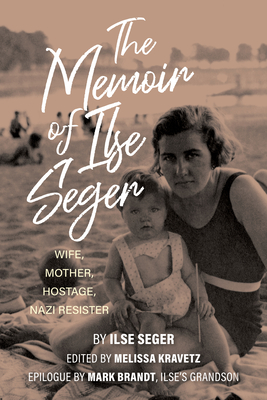The Memoir of Ilse Seger: Wife, Mother, Hostage, Nazi Resister

The Memoir of Ilse Seger: Wife, Mother, Hostage, Nazi Resister
Elisabeth "Ilse" Seger was the wife of Gerhart Heinrich Seger, a German Social Democratic member of the Reichstag from 1930 to 1933. He was reelected for the last time on March 5, 1933, shortly after Hitler came to power. A week later, the Nazis arrested him and held him in "protective custody" for three months in a local prison in Dessau and then sent him to Oranienburg concentration camp for six months, until he escaped to Czechoslovakia.
In The Memoir of Ilse Seger, Ilse tells Gerhart's story, but more importantly, she tells her own story: of her early resistance to the Nazi regime as a political opponent herself; of her solidarity with the Jews during the early years of Nazi persecution; of her defiance of expectations for women at the time; of her time as a hostage alongside her daughter, Renate, in Rosslau concentration camp and how they got out with help from members of Parliament; and, lastly, of her first years living in exile in France and Switzerland as her husband went on an anti-fascist speaking tour in<
PRP: 289.33 Lei
Acesta este Prețul Recomandat de Producător. Prețul de vânzare al produsului este afișat mai jos.
260.40Lei
260.40Lei
289.33 LeiIndisponibil
Descrierea produsului
Elisabeth "Ilse" Seger was the wife of Gerhart Heinrich Seger, a German Social Democratic member of the Reichstag from 1930 to 1933. He was reelected for the last time on March 5, 1933, shortly after Hitler came to power. A week later, the Nazis arrested him and held him in "protective custody" for three months in a local prison in Dessau and then sent him to Oranienburg concentration camp for six months, until he escaped to Czechoslovakia.
In The Memoir of Ilse Seger, Ilse tells Gerhart's story, but more importantly, she tells her own story: of her early resistance to the Nazi regime as a political opponent herself; of her solidarity with the Jews during the early years of Nazi persecution; of her defiance of expectations for women at the time; of her time as a hostage alongside her daughter, Renate, in Rosslau concentration camp and how they got out with help from members of Parliament; and, lastly, of her first years living in exile in France and Switzerland as her husband went on an anti-fascist speaking tour in<
Detaliile produsului













